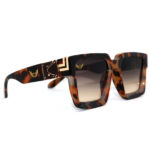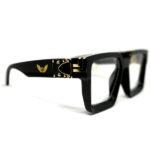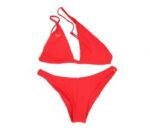Sunglasses have been in existence since the pre-historic times. They are designed to protect from bright sunlight that causes discomfort to the human eyes by blocking harmful rays. They are also used as visual aids as they improve visual clarity and comfort by protecting our eyes from glare. From the 1930s, sunglasses have become very popular and started being used for fashion purposes. Sunglasses that filter 99% of UVA and UVB lights, and have a wavelength of 400 nm are considered as best for use by experts.
As great as sunglasses are, do they provide protection from blue lights or artificial lights? Let’s take a look at what blue light is and how we can best protect our eyes from it.
What is Blue Light?
Blue light is a high-energy visible (HEV) light in the violet end of the spectrum typically found within the 380-500 nm wavelength. Blue light is naturally produced by the Sun but can also be found in computer monitors, Smartphone screens and other digital devices, LED and fluorescent lights, and compact fluorescent light bulbs.
Since our main source of blue light is the sun, we are most exposed to it when we are outdoors during daylight hours. It is important to note here that blue light isn’t inherently bad for you- it’s an excess of blue light that can have negative effects. Getting natural sources of blue light from the outdoors and from sunlight is good for you, as it improves attention, helps memory and mental function, and uplifts your mood. It is also essential to regulate the circadian rhythm- our body’s natural restiveness and sleep cycle.
However, laboratory studies have shown that too much contact with blue light may damage light-sensitive cells in the retina of our eyes. Unfortunately, human beings are exposed to more blue light than ever because of the widespread of the LED technology. Our eyes are not equipped to blocking blue light. Almost all of it passes through the cornea and lens and reaches the retina, making the eye susceptible to damage. Many problems are caused by blue light such as dry eyes, muscular degeneration, eyes straining, sleep cycle disruption and so on.
How do we block Blue Light?
The best way to block blue light is by using Blue Light Glasses.
Blue light glasses are specially designed lenses that helps in blocking the blue lights which comes from digital screens like laptops, computers etc. These glasses are anti-glare and they help to protect our eyes from the retina which can be damaged due to prolonged exposure of blue light. Blue light glasses are also called Computer or Screen glasses.
In today’s world where everyone is so much in touch with gadgets, demand for blue light glasses has increased considerably. These blue light blocking glasses can block out up to 30% of blue light exposure. They also aid in increasing the production of melatonin. Melatonin is a hormone released in the brain that helps you sleep faster and better. So the longer you wear your blue light blocking glasses, the more you will be able to protect your eyes from digital strain, which is a common cause of blurred vision and headaches.
Blue Light Glasses or Sunglasses?
Both blue light sunglasses and sunglasses are types of eyewear. They both help in reducing glare and provide visual clarity. However, whenever you’re working with digital screens or under artificial lighting, it is best to wear blue light glasses.
This is due to the fact that blue light glasses are specifically built to filter blue lights which come from tablets, smart phones, computers etc, as it has anti-glare. Blue light glasses are however to be worn inside because it doesn’t help with UV protection.
Sunglasses on the other hand are most suitable for outdoors because they offer protection from harmful UV rays (it is important to buy sunglasses labelled UV400). They don’t help with circadian alignment or protects from artificial lights like blue light glasses does, so it is not advisable to use them as an alternative to blue light glasses.
Likewise, it is also not advisable to wear blue light glasses all day every day, especially when outdoors because they won’t give you the adequate protection that UV400 sunglasses will.


